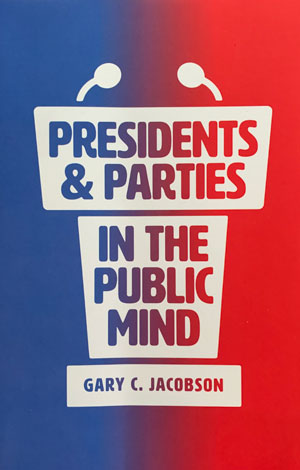
From analyses of thousands of commercial and academic public opinion surveys covering presidents from Truman to Trump, with results detailed in 54 tables and 93 figures, I argue that modern American presidents have had a profound and pervasive impact on how the public views their parties. Every president has shaped public attitudes toward his party and the other politicians in it; beliefs about who and what it stands for; assessments of how well it governs when in power; and its attractiveness as an object of personal identification. Insofar as the party label represents a brand name, the president bears prime responsibility for the brand’s current image and status.
Specifically, I find that:
One. Although existing partisan biases influence people’s feelings about prospective presidents as soon as they appear on the political scene, presidential candidates and presidents immediately begin to exert a reciprocal influence on how people feel about their parties that grows stronger as election day approaches, remains potent while they serve, and continues, though with diminished force, after they have departed.
Two. Evaluations of and feelings toward sitting presidents strongly and persistently influence how Americans evaluate and feel about their parties generally and about their party’s congressional wing and its leaders more specifically. Presidential influence on attitudes toward the party remains consistent across partisan subgroups (self-identified Republicans, Democrats and independents), administrations and survey question formats.
Three. Popular evaluations of the president’s performance generally and in specific domains have a direct effect on his party’s reputation for competence in dealing with national problems generally and in managing foreign relations, the economy, and several other issue domains.
Four. Presidents and presidential candidates shape and reshape public perceptions of their party’s position on policy issues. Although Americans have durable beliefs about where the parties stand on specific issues and their location on the general left-right dimension, they adjust their beliefs according to where they place the current president or presidential candidates.
Five. Popular assessments of the president’s performance influence both individual and mass partisanship both in the short and longer runs. The balance of Democrats and Republicans in the electorate varies with presidential approval ratings; such short run effects are usually reversible but have at times solidified into durable changes. Because party loyalties are most malleable early in political life, citizens newly entering the electorate contribute disproportionately to shifts in mass partisanship. A president’s most enduring influence is thus on the partisan identities of people who come of political age during his administration, and the extent of a president’s appeal—or lack thereof—to younger citizens has long-term implications for the future partisan composition of the electorate.
Six. Views of presidents and presidential candidates affect voters’ decisions in down-ballot races both directly and, through their effect on party images and party identification, indirectly, and thereby influence their party’s performance in congressional and other elections.
Seven. Presidents and presidential candidates have contributed importantly to the gradual realignment of the parties that has left the current American electorate more deeply divided along party lines than at any time in living memory.
Eight. Partisan polarization was essential to the election of Donald Trump. Although Trump executed a hostile takeover of the Republican Party and continues to attract vigorous criticism from some of its luminaries, his impact during his first year in office on how people view his party has been at least as large as that of previous presidents. In the intra-party struggle for the hearts and minds of ordinary Republicans, Trump has so far emerged as the consistent winner. But given his unpopularity outside core Republican circles, and especially among growing segments of the population, Trump’s dominance and prospective rebranding of the Republican Party threatens to erode its popular image, reputation, and appeal both immediately and for the long term.
In the broadest sense, the book is meant to contribute to our understanding of how American democracy operates. It is guided by and adds to the scholarly literatures on survey research, public opinion, political parties, congressional elections, political parties, and the presidency. The idea for it emerged from research for an earlier book on the public’s reaction to President George W. Bush’s performance and policies, particularly regarding the Iraq War. I suspected that the growing unpopularity of Bush and the war during his second term might have inflicted collateral damage on the Republican Party and found evidence that it did. This raised the question of whether performance ratings of other presidents affected their party’s public standing, and the answer, after some additional research was a clear “yes.”
While pursuing that question, I discovered the wide variety of ways in which opinion surveys had, over the postwar period, sought to measure popular reactions to presidents and their parties. These studies produced a remarkably rich trove of data for examining myriad ways in which modern presidents and presidential candidates have influenced how people view their parties. I reported analyses of some of these data in a series of papers and journal articles but eventually decided that only a book offered the latitude adequate to the data and subject. I aimed to finish book with the completion of the Obama administration, but as I was wrapping it up, Trump was elected, and the question of how such a bizarrely unorthodox president might alter the relationships I had been investigating was too intriguing to ignore, so I added a section on his campaign and early presidency. I continue to collect data on Trump and the Republican Party and will be updating my analyses of his administration in future work.
At the heart of the book are the data. A look at chapter 3 would be a good way to get a feel for my approach. The material in this chapter was the first I analyzed, and the graphic depictions of the relationships between attitudes toward the president and parties, variously measured, make these relationships very clear. Specifically, the figures on pp. 35-39 and 48-50 will let readers know what excited me about the project in the first place. I also recommend looking at the section on party competence (pp. 63-71), especially table 4.1 on p. 67, which shows the remarkable consistency with which presidential performance has shaped party reputations for dealing with the most important national problem across every administration from Truman’s to Obama’s. Readers interested in generational imprinting of partisan attitudes, which bears on how Trump might shape the future party coalitions, should look at chapter 7 (p. 144-150) and chapter 9 (pp. 198-208).
The central implications of my research are inherent in the findings themselves: Whether intentional or not, a president’s words and actions profoundly affect how the public regards his party on virtually every dimension (and, if only by contrast, the rival party as well). Presidents who govern well (as the public sees it) benefit their parties—and therefore themselves if they care about reelection or historical reputation—which is a good thing insofar as it gives them an incentive to govern well. Presidents who do not govern successfully or who otherwise manage to alienate large portions of the public weaken their parties at least temporarily and potentially long after they are gone. This puts their fellow partisans in something of a quandary: They have every reason to help their president enhance his public standing if they can, and panning his words and actions will not help. But individual and collective affirmation of an unpopular president may compromise their own and their party’s political futures. Watching this quandary play out in real time is fascinating and, at times, more than a little unnerving.


Gary C. Jacobson is Distinguished Professor of Political Science Emeritus at the University of California, San Diego, where he taught from 1979 to 2016. He received his A.B. from Stanford in 1966 and his Ph.D. from Yale in 1972. He specializes in the study of U.S. elections, parties, interest groups, public opinion, and Congress. In addition to this book, he is the author of Money in Congressional Elections, The Politics of Congressional Elections, The Electoral Origins of Divided Government, A Divider, Not a Uniter: George W. Bush and the American People, and coauthor of Strategy and Choice in Congressional Elections, and The Logic of American Politics, as well as more than 120 articles in academic journals and collections.